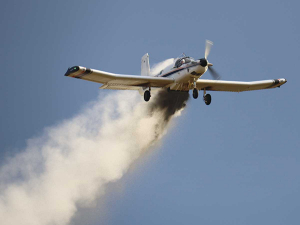Farm Debt Mediation a useful backstop — Feds
Farmers are throwing their support behind the Farm Debt Mediation Scheme.
 A new aerial safety levy is likely to increase the cost of spreading fertiliser and spraying crops for farmers.
A new aerial safety levy is likely to increase the cost of spreading fertiliser and spraying crops for farmers.
The New Zealand Agricultural Aviation Association (NZAAA) is up in arms about a proposed new safety levy.
They say it unfairly targets the ag sector and will lead to increased costs of spreading fertiliser and spraying crops.
NZAAA chairman Tony Michelle says his organisation is happy to pay levies set by the Civil Aviation Authority (CAA). However, he believes the new proposals are almost double the present ones and says there is a huge inconsistency in the way these would be applied.
Some operators believe the ag sector is seen as a soft target by the CAA, because it assumes the new charges will just be passed on to farmers.
Michelle says the CAA want to apply the levy to agricultural operators on a per tonne basis, which for spraying operations that means 1000 litres per tonne of water.
“I operate an AS 350 Squirrel helicopter and when it’s on spraying on the tonne levy, we will pay around $7 or $8 per tonne. But if we were putting lime on at very heavy rates we could be paying up to $34 per tonne,” he told Rural News.
“When it comes to fixed wing topdressing, they could be paying up to $34 per operation hour. That’s because the productivity rates of putting on high rates of fertiliser is a lot higher than on spraying operations.”
But Michelle says the inconsistency of the proposal is demonstrated by the fact that when that same aircraft is out carrying passengers it will just pay a flat rate of $6.84 per hour. He says the reality is that there is no third party risk when he’s undertaking agricultural operations and can’t see why he should pay a whole lot more money for ag use as opposed to passenger operations.
“So what the CAA is saying is on one hand when I take my helicopter out and fly people around they trust me, but when I put my spray gear or the fertiliser bucket on that same aircraft they don’t trust me,” he says.
Michelle says the same inconsistency applies to fixed wing operators.
“For example the operator of a Cresco topdressing aircraft spreading lime would pay up $54 per hour, but if the same aircraft was carrying parachutists it would be liable for just the $6.84 per hour fee.”
According to Michelle the so called ‘safety levy’ is supposed to pay for the services the CAA provides and the oversight it has over the ag aviation industry. The NZAAA is in the process, through an Official Information Act request, to see just what CAA has actually been doing over the last two years by way of oversight of the industry. He says there is a suspicion that the CAA has not undertaken any routine surveillance audits of agricultural operators because they haven’t got the staff or resources to do so.
“The other thing the CAA wants to do is impose a 57 cent a tonne levy on the ag aviation sector on fertiliser or chemical spreading to cover its obligations under the HSNO Act,” Michelle adds. “But in actual fact fertiliser doesn’t have a HSNO classification and there is a levy in place in regard to chemicals which is actually paid for by the chemical companies. You could argue that the CAA is double dipping,” he says.
Cost to farmers
Tony Michelle says if the levy is set as proposed, the costs will have to be passed on to farmers.
He estimates in the case of a large hill country farm, the cost for spreading lime could be in the order of more than $3000.
Michelle says while this may seem small in the overall scheme of things, it is yet another cost farmers are facing with uncertainty over the myriad of environmental changes that are looming and which will cost farmers to comply.
“The ag aviation sector is in what I would call a ‘stagnant state’. It’s ok, not stellar and a lot of what is driving that is that farmers are being very cautious because of the uncertainty,” he told Rural News. “It appears that they are keeping their cheque books in their pockets,” he says.
Michelle says NZAAA is standing up against CAA because the levy will affect everyone in rural communities.
Controls on the movement of fruit and vegetables in the Auckland suburb of Mt Roskill have been lifted.
Fonterra farmer shareholders and unit holders are in line for another payment in April.
Farmers are being encouraged to take a closer look at the refrigerants running inside their on-farm systems, as international and domestic pressure continues to build on high global warming potential (GWP) 400-series refrigerants.
As expected, Fonterra has lifted its 2025-26 forecast farmgate milk price mid-point to $9.50/kgMS.
Bovonic says a return on investment study has found its automated mastitis detection technology, QuadSense, is delivering financial, labour, and animal-health benefits on New Zealand dairy farms worth an estimated $29,547 per season.
Pāmu has welcomed ten new apprentices into its 2026 intake, marking the second year of a scheme designed to equip the next generation of farmers with the skills, knowledge, and experience needed for a thriving career in agriculture.

OPINION: Here w go: the election date is set for November 7 and the politicians are out of the gate…
OPINION: ECan data was released a few days ago showing Canterbury farmers have made “giant strides on environmental performance”.